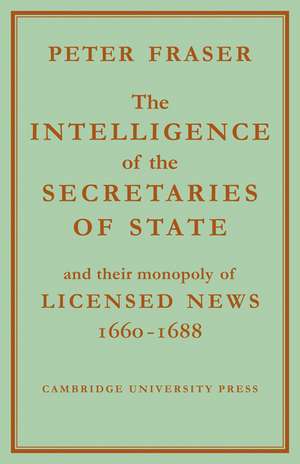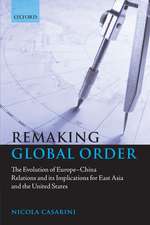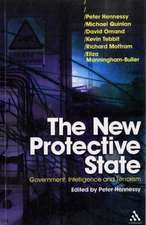The Intelligence of the Secretaries of State: And their Monopoly of Licensed News
Autor Peter Fraseren Limba Engleză Paperback – 29 iun 2011
Preț: 279.76 lei
Nou
Puncte Express: 420
Preț estimativ în valută:
53.53€ • 55.89$ • 44.30£
53.53€ • 55.89$ • 44.30£
Carte tipărită la comandă
Livrare economică 05-19 aprilie
Preluare comenzi: 021 569.72.76
Specificații
ISBN-13: 9781107608856
ISBN-10: 1107608856
Pagini: 202
Dimensiuni: 140 x 216 x 12 mm
Greutate: 0.26 kg
Editura: Cambridge University Press
Colecția Cambridge University Press
Locul publicării:New York, United States
ISBN-10: 1107608856
Pagini: 202
Dimensiuni: 140 x 216 x 12 mm
Greutate: 0.26 kg
Editura: Cambridge University Press
Colecția Cambridge University Press
Locul publicării:New York, United States
Cuprins
Preface; List of illustrations; Introduction; Part I. The Secretaries as the Eyes of the Government: 1. The use of spies; 2. The control of the Post Office; 3. Money spent on intelligence; 4. The newsletter system; Part II. The Secretaries as the Voice of the Government: 5. The official printed news, 1660–88; 6. The earliest Continental gazettes and English newsbooks; 7. Prevailing attitude to printed news at the Restoration; 8. Henry Muddiman introduces the official newsletter; 9. Its raison d'être; 10. Continental newsletters; 11. Their connexion with the gazettes, illustrated by the example of Abraham Casteleyn; 12. Muddiman's relations with Williamson, the Under-Secretary. The latter brings out the London Gazette; 13. Both Secretaries share responsibility for the London Gazette; 14. The kind of news in the Gazette and the official newsletters; Part III. Foreign Correspondents: 15. The business of the Secretary's office; 16. Foreign posts used by the Secretaries; 17. Arlington's foreign correspondents; 18. The use of cover addresses; Part IV. The Division of the Fleet, 1666: 19. Circumstances of the division of the fleet, and the ensuing defeat; 20. Attributed by a Commons Committee to a false intelligence; 21. William Coventry and Arlington particularly blamed at Clarendon's investigation; 22. Errors in the Committee's report on the 'want of intelligence' from abroad; 23. Albemarle's information at the time the fleet was divided; 24. The political background to the investigation by the Commons into the miscarriage of the Second Dutch War; 25. Secretaries Morice and Arlington give an account of the intelligence; 26. Williamson produces Arlington's papers; 27. The effectiveness of Arlington's intelligence assessed, in detecting the state of Dutch naval preparations, and de Beaufort's movements, prior to the division; 28. Opinions as to the relative efficiency of Thurloe; Part V. The Intelligence in the Third Dutch War: 29. Williamson's journal commenced before the outbreak of war; 30. The missions of spies sent into Holland: Taylor, Langley, John Scott, Vernon, Nipho, Gelson; 31. The Dutch fail to prevent a conjunction of the French and English fleets; 32. Settled informants in Holland: Casteleyn, Timens, Hildebrand, Vlieyger, Boeckell, Tucker; 33. Operations of the packet-boats to Holland; 34. Movements of the fleets. The English and French surprised in Solebay; 35. Other spying activities in Holland; 36. Estimate of the Secretary's expenditure on intelligence in wartime; Part VI. The Secretaries and the Unlicensed News-Mongers: 37. The growth of an organized public opinion; 38. Eventual failure of the Secretaries to uphold their monopoly of licensed laws; 39. Some justification for the monopoly; 40. The growth of coffee-houses, and the attempt to suppress them; 41. The unlicensed newsletter writers; 42. Expiry of the Licensing Act, 1679, and the Whig newspapers; 43. Changing attitudes to printed parliamentary proceedings; 44. Some Whig newsletter writers; 45. Effects of the London Penny Post; 46. The increasing resources of the unlicensed newswriters: their part in the Revolution. The end of the Secretaries' monopoly of licensed news; Appendices; Bibliography; Index.
Descriere
This is a 1956 study of the Secretaries of State in Restoration England.















